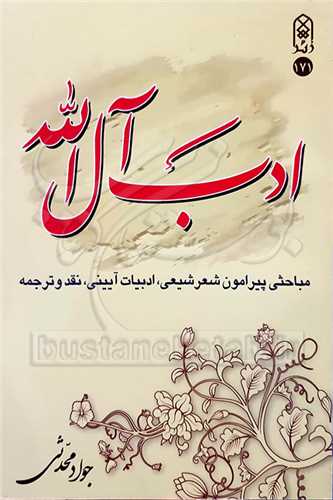Javad Muhaddethi, Adab Āl Allāh, Qum: Za’er, 1387 Sh/ 2008. 188 pp.
This is a short, introductory book on Shii Islamic ritual literature, written by a Qum-based cleric who is famous for his literary works in Persian. The scope of the book covers a wide range of topics that deal with literature in connection with Shii doctrines, commitment, Ghadīr, Ashura, commemoration of the martyrdom of Hz. Fāṭimah al-Zahrā, the daughter of the Prophet Muḥammad, and certain key figures in Shii literature, e.g., Kumayt al-Asadī, Abu al-Aswad al-Duʼalī, al-ʽAbdī al-Kūfī, Sharīf al-Murtaḍā, and Shii literature and the Islamic Revolution of Iran.
The significance of the book arises from its highlighting certain important nexuses in Shii socio-intellectual life in connection with doctrine-based literature that has been produced throughout history. An markworthy between-the-lines of the book is that most significant incidents have left their impacts in Shii literature, irrespective of the language. It follows that Shii Islamic literature cannot be restricted to Arabic or Persian, rather it may be produced in any language spoken a Shii community. A corollary of this point is that Shii literature is not limited to any pre-defined geographical location or territory. It may be available wherever there is a Shii community that still firmly believe in their religious values and history.
 The book turns to Shii committed literature, or Shii literature of commitment, without any recourse or reference to the origins of the term ‘commitment’ to its European origin. However, by ‘commitment’, it is meant loyalty to Shii Islamic religious creeds, history, and identity. It details on two kinds of literature: that of sincerity in contrast to that of duplicity. Drawing on real examples, it shows how and in what way(s) these two manifestations of literature differ from one another. In a few words, ‘commitment’ makes sense in the light of firm belief in God and the school of the Islamic religion, the Shii denomination, moral values, the rightful side, the literary qualities, and a sense of sincerity between what the author or producer of the work provides and his own dispositions.
The book turns to Shii committed literature, or Shii literature of commitment, without any recourse or reference to the origins of the term ‘commitment’ to its European origin. However, by ‘commitment’, it is meant loyalty to Shii Islamic religious creeds, history, and identity. It details on two kinds of literature: that of sincerity in contrast to that of duplicity. Drawing on real examples, it shows how and in what way(s) these two manifestations of literature differ from one another. In a few words, ‘commitment’ makes sense in the light of firm belief in God and the school of the Islamic religion, the Shii denomination, moral values, the rightful side, the literary qualities, and a sense of sincerity between what the author or producer of the work provides and his own dispositions.
In a yet another section, the book tackles the question of Shii poetry of commitment. Drawing upon the works of such Arab poets as al-Sayyid al-Ḥimyarī, it instructs that literature must be content-wise strong. For further instances of Shii Islamic literature of commitment, the book draws upon poems on Ghadīr Khumm and Ashura, two significant historic episodes in the Shii history. A great majority of poems are in Persian, with some instances in Arabic. This is a good practice, for the primary audience of the book consists of Persian-reading people. In the case of Ghadīr, the book draws upon the magnum opus of the late Allamah Abd al-Husayn Amini whose voluminous al-Ghadīr has always been a landmark compilation, pact with original thoughts.
In the section concerned with Ashura-themed poetry, the book focuses on the contents of Shii literature. While the event of Ghadīr Khumm focuses on the point of religious superintendence which is manifested in the personality of the first Infallible Imam ʽAlī, Ashura-oriented literature concentrates on such topics and themes as sacrifice, martyrdom, and safeguarding the Islamic religion at the cost of one’s life.Eveidence were brought from the poems composed by notable Iranian poets, e.g., Muhtasham Kashani. It cites a hadith from the sixth Infallible Imam Jaʽfar al-Ṣādiq in that the reward of any line of poem will be a paradise house.
In addition to certain poems concerned with the martyrdom of Hz. Fāṭimah al-Zahrā that make the subject of another section of the book, it deals with a couple of renowned Shii poets who received the praises of the Infallible Imams.
The rest of the book is devoted to a couple of exemplary poets who have been famous for their belief-based approaches to Shii letters and literature. A concluding section of the book deals with Ashura-oriented poetry in contemporary Iran and the currents of change that led to the (1357 Sh/ 1979) Islamic revolution of Iran.
Muhammad-Reza Fakhr-Rohani
University of Qum,
Iran
